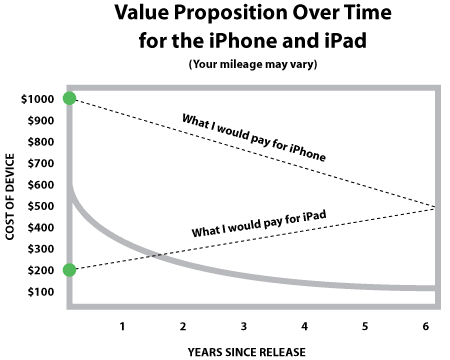Well, it’s January, and as has become commonplace over the last several years, the public is abuzz with anticipation over a new Apple device. This time it’s a tablet.
I think the single most interesting thing about this unannounced tablet is how pumped everyone is about it, despite its lack of obvious value proposition. When we get new Mac models, we get lighter, faster, and prettier machines. When we got the iPod, we got a whole new paradigm for consuming music. And of course, when we got the iPhone, we got the ability to replace multiple devices with a single, all-in-one device that did everything much, much better.
With this tablet thing, however, I feel like I’m much more skeptical than the press, the fanboys, and everyone else who thinks it’s such a slam dunk to change the world. It’s like the greatness of the iPhone has everyone thinking Apple is somehow going to top that level of revolution with each new market they enter. There has always been a magical quality to the company’s development and introduction of products under Steve Jobs, but I wonder if expectations are a bit too high at this particular point in time.
In my opinion, even if the Apple tablet succeeds, I can’t see how it will have nearly as much impact as the iPhone, the iPod, or the Mac; and if it fails, it will be end-of-lifed or morphed into something else within a few years. I don’t think it will replace the laptop and I don’t think it will totally re-invent anything we currently do on our computers. Whereas the multi-touch interface enabled us to do things we’d never dreamed of doing on pocket devices before, I’m not sure it will do the same for bigger screens.
This, from a guy who sleeps in rose-colored Apple-shaped glasses.
In trying to square my lack of enthusiasm with what I’ve been reading about this thing, I keep coming back to the question: what’s it for?
First of all, I think this device is almost entirely for consumption, and not production. It will be borderline unusable for writing essays, designing posters, making movies, and even sending emails. When you want to produce something, you will not do it with this tablet.
With consumption and severely limited production as the premise, what sorts of things could you do with this device? I see four possibilities that could be construed as compelling:
- Television tethering
- E-publication reading
- Portable video viewing
- Video chat
Television tethering
This is probably the only thing on the list that would singlehandedly cause me to purchase an Apple tablet. I haven’t heard anyone talk about it, but this is how it would go: the tablet comes with a dongle that can connect via RCA/component/HDMI to any television. The tablet communicates wirelessly with the dongle to both send video to it via 801.11N (or whatever shiny, new, faster wireless interface is next) and also to control the TV watching experience. In this scenario, you could use it to relay things like live Hulu streams to your TV or display stored video you bought from iTunes or “borrowed” from somewhere else.
There is also a chance this could be done in concert with Apple TV instead of a dongle, but the clear problem it solves for me is “how can I easily display on television the video that is currently playing on my computer?” Right now, the answer to that is to carry my laptop over to my TV, plug it into an extra input, pop the video player full screen (if I even can), and then walk back over to the laptop every time I need to control something. It’s the critical link that is keeping Hulu and similar services from being a much bigger part of my life.
My feeling is that Apple TV has never done as well as Apple hoped, but also that it is not something the company is going to give up on anytime soon. Part of me wonders if the tablet, among other things, is just a much better form to stuff Apple TV functionality into. If it is, I’m probably in.
E-publication reading
Almost everyone who has a Kindle loves the hell out of it. I probably would have bought one awhile ago, but I just don’t read enough books to justify it. Aaron Swartz, on the other hand, with his 132 book per year reading pace, could probably justify owning three (sidenote: WTF Aaron!) (sidenote #2, WTFFFFF JOE!!!). If the Apple tablet did e-books plus a few other things in this list, however, I might be a buyer.
To me, the biggest clue that Steve Jobs cares about this market is that he says he doesn’t. Jobs famously said a few years ago, in response to a question about entering the e-book reader market:
“It doesn’t matter how good or bad the product is, the fact is that people don’t read anymore.”
Not only is that statement preposterous, but it flies in the face of the positioning Apple tries to bestow on its products: that they are for intelligent consumers. Guess what is strongly associated with intelligence? Reading. Particularly books. What Jobs really meant by his statement was:
“People are reading fewer and fewer books because they are less convenient than other types of media.”
The first statement is terse, dismissive, and meant to throw the press off Apple’s scent. The second statement is what you will probably hear at the launch event.
Another clear clue that e-publication reading is a large part of the Apple tablet is the flub by Bill Keller of the New York Times a few months ago. Keller’s unauthorized reference to the tablet all but guarantees they have a deal with Apple to display New York Times content on this device. It could be something very simple and uncompelling like a Times Reader app that is offered for free, but what if it’s something more substantial like the New York Times actually subsidizing the tablet if you sign up for a two year subscription to the e-NYT? I’m actually less interested in what the New York Times (and other) content looks like on the tablet and more intrigued by what the economics behind this sort of content delivery look like.
Another question I have about this tablet — if it’s going to compete with the Kindle — is what its equivalent of E Ink is. The Kindle enjoys a whopping one week battery life largely because it doesn’t require a backlight to operate. Currently, all of Apple’s screens are backlit, and unless the company has an answer to that, it may have problems competing head-to-head with the Kindle on pure e-book reading. Or has Apple invented a way to overlay an E Ink screen on the same surface as an LCD screen? That would be ridiculously awesome.
Portable video viewing
There aren’t a whole lot of really great solutions out there for watching video on the go. An iPhone is too small for most people, while a laptop is probably overkill. A tablet with 15-20 hours of battery life and the ability to stand up like an easel might fit the bill perfectly for viewing on a bus, on a plane, in a car, or elsewhere on the go.
I don’t think this benefit alone would sell a lot of tablets, but it would help justify a purchase for some people.
Video chat
I’ve never been into video chat as I find it extremely awkward, but I understand it’s big in the grandparents’ set and every other set where people are potentially far away from loved ones. While I mentioned above that I don’t expect a lot of content production to be done on the tablet, live video capture and broadcast could be a notable exception because it requires you to do nothing but look into the tablet and speak.
A few thoughts on form factor
A lot of my skepticism around tablet computing stems from my belief that the form factor just isn’t as beneficial as it seems. Besides when sitting in a cramped airline seat, I don’t recall many situations in which I wished the bottom half of my laptop would disappear. When I have, it’s always been for high-volume consumption: long form video and long form text. In other words, things that don’t require me to do much of anything besides staring at the screen. Does a market exist for a device that does just these things and not much else? I think the Kindle has proved that at the right price point, the answer is yes. I guess I just don’t consider that as world-changing of a product as other people do. I guess we won’t know until we see it though, right?
As far as actual form-factor goes, I expect something significantly more klutz-proof than the iPhone. My guess is an all-aluminum body with an aluminum panel that covers the device’s screen when closed and folds open to double as an easel when you’re using the device on a flat surface. I expect a solid-state drive as the only storage option but would like to see an SD-card slot as well. 801.22N (or better) wireless is a given, but if this thing has 3G/4G connectivity, it’s not going to be through AT&T. If I had to bet one way or another, I would be on wifi only. If this device is successful, it’s another bargaining chip for Apple when it renews iPhone negotiations with carriers, and I don’t think this sort of connectivity would sell many more units right now.
So anyway, that’s all I have for now. I expect a device that will sell a decent amount of units but fall short of the world-changing expectations placed upon it by people who think Apple will never release another product that doesn’t top its previous one.


 Perhaps this is already obvious to everyone else who has inbox overload, but I just figured out what I hate about e-mail and task management: they work against each other. Even if you’re the sort of person who diligently creates to-do lists in applications such as
Perhaps this is already obvious to everyone else who has inbox overload, but I just figured out what I hate about e-mail and task management: they work against each other. Even if you’re the sort of person who diligently creates to-do lists in applications such as 


